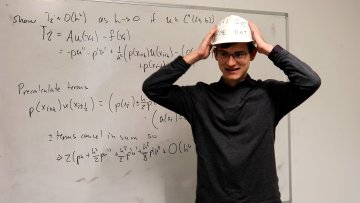16:30
Optimal mass transport and sharp Sobolev inequalities
Please note a different room and that there are two pde seminars on Monday of W5 (May 22).
Abstract
Optimal mass transport is a versatile tool that can be used to prove various geometric and functional inequalities. In this talk we focus on the class of Sobolev inequalities.
In the first part of the talk I present the main idea of this method, based on the work of Cordero-Erausquin, Nazaret and Villani (2004).
The second part of the talk is devoted to the joint work with Ch. Gutierrez and A. Kristály about Sobolev inequalities with weights.



